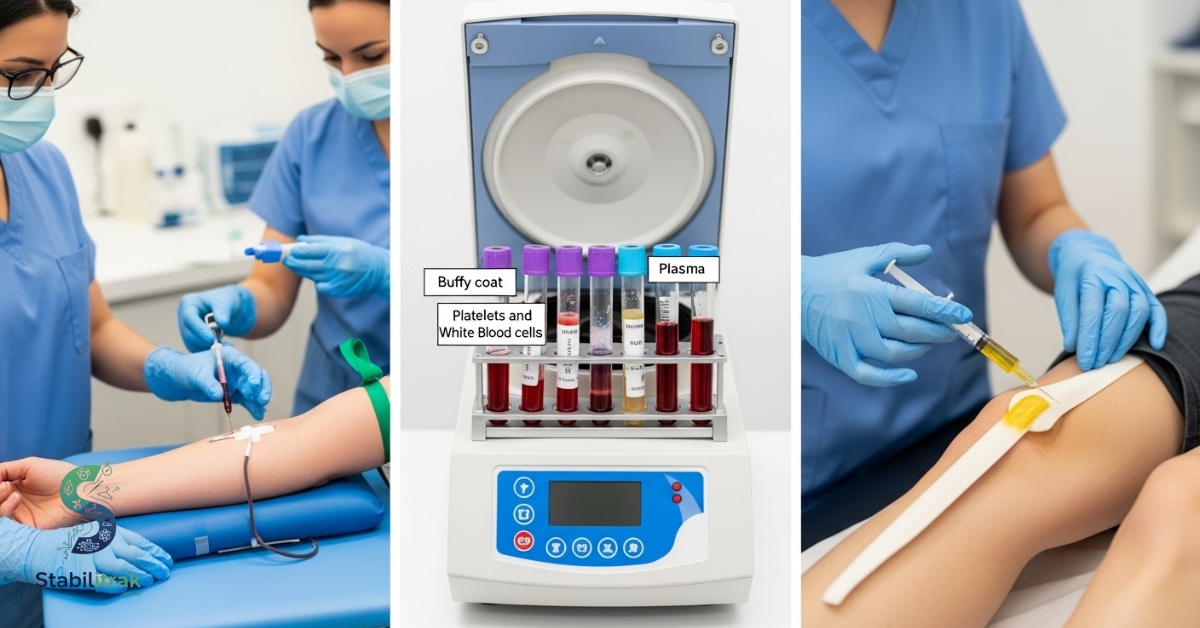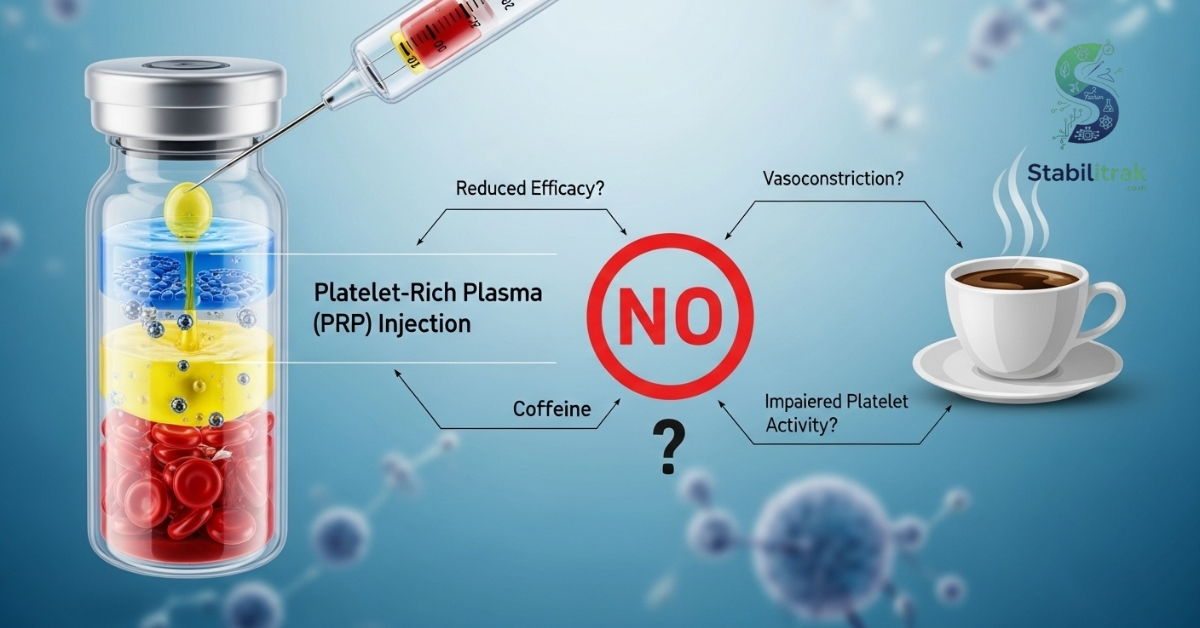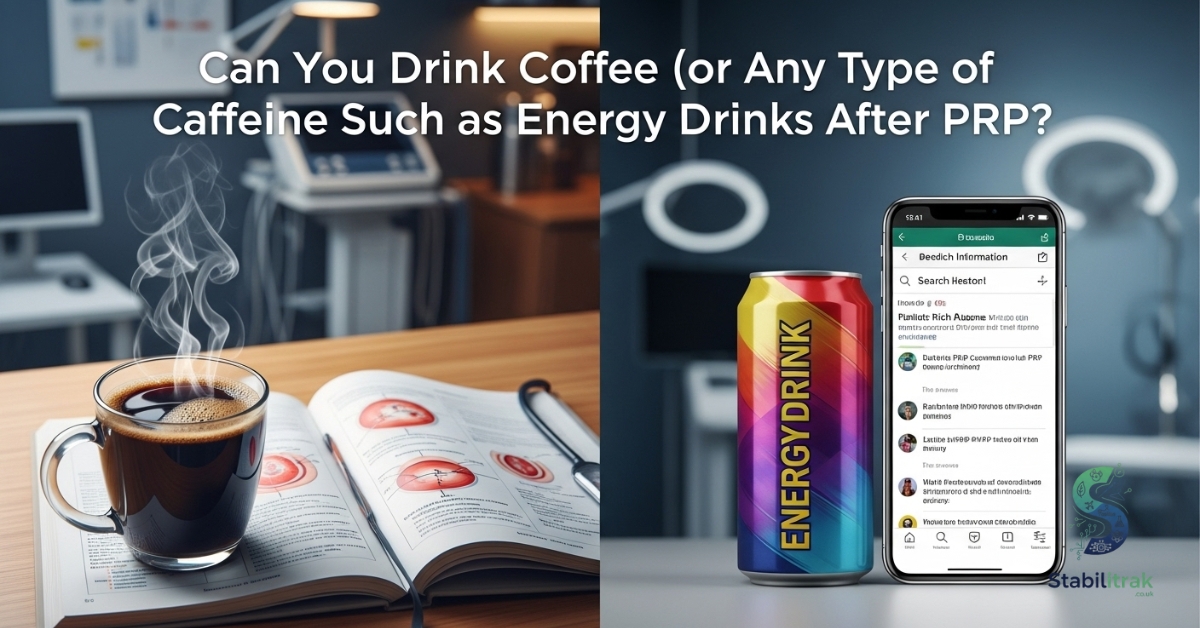I just had my first PRP treatment and was shocked when my doctor told me to avoid my morning coffee. Like, “Why no caffeine after PRP?” I didn’t realize my daily cup could actually affect how well my treatment works. If you’re wondering the same thing, you’re definitely not alone. A lot of people feel confused about this advice.
In this post, we’ll break down exactly why caffeine can interfere with your PRP results and how skipping it for a short time can actually help you heal faster. You’ll learn what happens inside your body after PRP, why coffee or tea might slow the process, and what you can do instead to support better recovery. By the end, you’ll know how to make the most of your treatment and feel confident about your aftercare routine.
What is Platelet-Rich Plasma?
Platelet-rich plasma (PRP) is a cutting-edge treatment that uses your body’s own healing powers. A small amount of your blood is drawn, spun in a centrifuge, and separated to concentrate the platelets. These platelets are packed with growth factors, tiny proteins that signal your cells to regenerate tissue, heal wounds, and boost circulation.
Because it’s made from your own blood, PRP therapy is considered a safe and natural option. Doctors use it for hair restoration, facial rejuvenation, sports injuries, joint pain, and even in dentistry or plastic surgery. Whether it’s scalp injections to encourage hair growth or microneedling with PRP for smoother skin, the treatment stimulates collagen production and cell regeneration without harsh chemicals or surgery.
Read More Article: How Long Does a Root Canal Take?
What Does the PRP Procedure Entail?

The actual PRP session is simple. First, your provider draws a small vial of blood. This blood goes into a centrifuge, which spins at high speed to separate plasma rich in platelets from red and white blood cells. The concentrated plasma is then injected or applied topically, depending on the treatment area.
From start to finish, the process usually takes 30–60 minutes. Because it’s non-invasive, there’s little downtime, but the days after your treatment are critical. This is when the platelets release their growth factors and start the tissue repair process. Lifestyle choices, including what you eat and drink, directly affect how well PRP works.
Read More Article: How Long Does a Lash Lift Last? A Complete Guide to Long-Lasting Results
Why No Caffeine After PRP? How Does Caffeine Affect PRP Injections?

This is the big question: why no caffeine after PRP? Caffeine, found in coffee, tea, energy drinks, and chocolate, is a stimulant with a strong effect on your blood vessels and platelets. It’s a natural vasoconstrictor, which means it narrows your blood vessels. When blood vessels constrict, less blood flows to the treated area. This can delay the delivery of nutrients and slow the release of growth factors that PRP depends on.
Caffeine also has a mild blood-thinning and platelet-inhibiting effect. Platelets need to clump together (aggregate) to start tissue repair, and caffeine can disrupt this process. In short, drinking coffee or caffeinated products right after PRP can reduce platelet activation, limit oxygen delivery, and compromise the healing process you just invested in.
How Long to Avoid Caffeine After PRP? When Can I Have Caffeine After PRP?
Most experts recommend avoiding caffeine for at least 48 to 72 hours after your PRP session. Some clinics suggest extending it to three to five days, especially for larger treatment areas like scalp injections or joint therapy. During this time, your platelets are at their most active, releasing growth factors and repairing tissue.
After three days, small amounts of caffeine, such as half a cup of coffee, are usually fine if your provider gives the go-ahead. However, always follow the specific guidelines from your doctor or clinic. Everyone’s healing timeline is slightly different, and sticking to the recommendation maximizes your results.
Can You Have Coffee Before PRP?
If you’re a coffee lover, you might also wonder about pre-treatment. In most cases, it’s best to skip caffeine on the morning of your appointment. Like aftercare, pre-treatment hydration and blood flow matter. Caffeine can dehydrate you and constrict blood vessels even before the procedure begins, potentially making blood draws harder or affecting platelet quality.
Try switching to water, herbal tea, or a decaffeinated version before your appointment. Arriving well-hydrated and caffeine-free gives your platelets the best chance to perform at their peak during treatment.
Read More Article: How Long Does Botox Last?
Can You Drink Coffee (or Any Type of Caffeine Such as Energy Drinks) After PRP?

Short answer: not immediately. Coffee, black tea, energy drinks, sodas, and pre-workout beverages are all off-limits for the first few days after PRP. Even small amounts can interfere with platelet activity and slow healing.
If you’re struggling with the habit, plan. Stock your fridge with caffeine-free alternatives like sparkling water, fruit-infused water, or herbal teas. These keep you hydrated without putting your results at risk.
What Else Should Be Avoided After PRP?
Caffeine isn’t the only factor that can slow your recovery. After PRP, you should also avoid:
- Alcohol and smoking: Both constrict blood vessels and reduce oxygen delivery to healing tissue.
- Anti-inflammatory medications (NSAIDs): Unless prescribed, avoid ibuprofen and similar drugs, as they can inhibit platelet function.
- Excessive heat or sweating: Skip saunas, hot showers, and intense exercise for 24 to 48 hours.
- Harsh skincare products: Avoid strong exfoliants, anti-aging treatments, or makeup on treated skin for a few days.
These guidelines give your platelets the environment they need to release growth factors and repair tissue effectively.
Does Coffee Affect PRP Injection for Hair?
Yes. For people undergoing PRP for hair loss, caffeine can still interfere. Hair follicle health depends on nutrient delivery and microcirculation at the scalp. If caffeine narrows your blood vessels or inhibits platelet aggregation, the scalp may not receive the full benefit of the treatment.
Skipping coffee for a few days might feel inconvenient, but it’s a small price to pay for stronger, thicker hair growth. Pair this with a nutrient-rich diet, lean proteins, leafy greens, berries, and omega-3 fatty acids to support your follicles from the inside out.
Should I Avoid Caffeine and Coffee After PRP Treatment?
Absolutely. This isn’t just a suggestion; it’s a key part of post-treatment care. Whether you’ve had PRP for hair restoration, facial rejuvenation, or joint pain, the principle is the same: platelets need optimal conditions to work. Caffeine disrupts those conditions.
If you’re worried about withdrawal headaches, start tapering your caffeine intake a few days before your appointment. This makes it easier to go without coffee afterward and helps you stay hydrated, which is another crucial factor in healing.
Caffeine Increases Pain and Inflammation
Caffeine can raise cortisol levels, which may increase inflammation and slow recovery. It can also amplify pain perception in some people, making post-injection soreness feel worse. Avoiding it allows your body to focus on repair, not stress hormones.
Caffeine Interferes with the Healing Process
Because caffeine constricts blood vessels and reduces blood flow, it limits oxygen and nutrient delivery to the injection site. This slows down tissue regeneration and delays visible results.
Caffeine Reduces the Effectiveness of the Treatment
Inhibiting platelet activation or aggregation means your PRP injection may not release growth factors as effectively. Even a single cup of coffee in the critical window could compromise your investment.
Caffeine Alternatives During Recovery
You don’t have to give up warm or flavorful drinks completely. Here are some caffeine-free options:
- Herbal teas (chamomile, peppermint, rooibos) — calming and hydrating
- Fruit-infused water — add lemon, cucumber, berries, or mint for a fresh taste
- Decaffeinated coffee — if you miss the ritual, switch to decaf
- Golden milk — a turmeric-based warm drink with anti-inflammatory benefits
- Sparkling water — for a fizzy pick-me-up without stimulants
These alternatives keep your hydration levels up, which directly supports platelet function and tissue repair.
What Products to Avoid After PRP?
Beyond caffeine and certain medications, be mindful of what touches your treated skin:
- Harsh skincare products: No strong acids, retinoids, or exfoliants for a few days.
- Makeup: Avoid until redness or swelling subsides.
- Sun exposure: Protect the area with gentle SPF after your provider approves.
- Blood-thinning supplements: High-dose vitamin E, niacin, garlic, and omega-3 supplements can also affect platelet function.
This extra care preserves your results and minimizes the risk of irritation.
How to Speed Up Recovery After PRP Injections
You can’t control how fast your body heals, but you can create the best conditions for it. Follow these steps:
- Drink plenty of water to stay hydrated.
- Eat anti-inflammatory meals with lean proteins, leafy greens, berries, and fatty fish.
- Get 7–9 hours of quality sleep.
- Manage stress with light walking, deep breathing, or gentle stretching.
- Avoid alcohol, smoking, and strenuous exercise for a few days.
These simple habits give your platelets the resources they need to release growth factors and repair tissue efficiently.
Conclusion
Now you know “why no caffeine after PRP” isn’t just a random rule. Caffeine constricts blood vessels, reduces platelet activation, and slows the release of growth factors—exactly the opposite of what PRP needs to work. By skipping coffee and other caffeinated drinks for a few days, you’re protecting your investment and giving your body the best chance to heal.
Follow your provider’s aftercare instructions, stay hydrated, eat nourishing foods, and try caffeine-free alternatives in the meantime. These small steps can make a big difference in your final results.
FAQs
Why no caffeine after PRP Reddit?
People on Reddit discuss avoiding caffeine after PRP because it can constrict blood vessels, reduce platelet activation, and slow healing. Skipping it helps your treatment work better.
Foods to avoid after PRP?
Avoid processed foods, fried snacks, sugary drinks, and refined carbs. These can increase inflammation and slow tissue repair after PRP.
What to avoid after PRP injection?
Skip caffeine, alcohol, smoking, NSAIDs, intense exercise, and harsh skincare products. This protects the treated area and boosts recovery.
When can I drink coffee after PRP?
Most experts recommend waiting at least 48 to 72 hours, sometimes up to five days. Always follow your provider’s specific advice.
Walking after PRP injection?
Light walking is usually safe right after PRP. Avoid strenuous activity for at least 24 to 48 hours.
Can I drink decaf coffee after PRP injections?
Yes, decaf coffee is generally allowed after PRP since it contains little to no caffeine. Check with your provider for confirmation.
Can I drink coffee after PRP hair treatment?
It’s best to avoid coffee for the first 2 to 3 days after PRP hair treatment to ensure better blood flow and platelet activation.
Can I drink tea after PRP?
Herbal teas are safe, but avoid black or green tea for at least 48 hours because of their mild caffeine content.
What causes PRP to fail?
Poor aftercare, dehydration, continued caffeine or alcohol use, and certain medications can reduce PRP effectiveness.
How can I increase my PRP results?
Stay hydrated, eat anti-inflammatory foods, avoid caffeine and smoking, get quality sleep, and follow your doctor’s aftercare tips.
What should you avoid after PRP treatment?
Avoid caffeine, alcohol, NSAIDs, smoking, heavy exercise, and heat exposure for at least 48 hours to maximize healing.
Can you drink tea after a PRP injection?
Yes, but stick to caffeine-free herbal teas. Avoid black or green tea for a couple of days.
Can I drink caffeine after PRP?
Do not immediately wait at least 2 to 3 days post-treatment to avoid interfering with platelet activity.
How does caffeine impact healing?
Caffeine constricts blood vessels, reduces circulation, and inhibits platelet activation. This slows tissue repair and the release of growth factors.







1 thought on “Why No Caffeine After PRP? Here’s What You Need to Know”